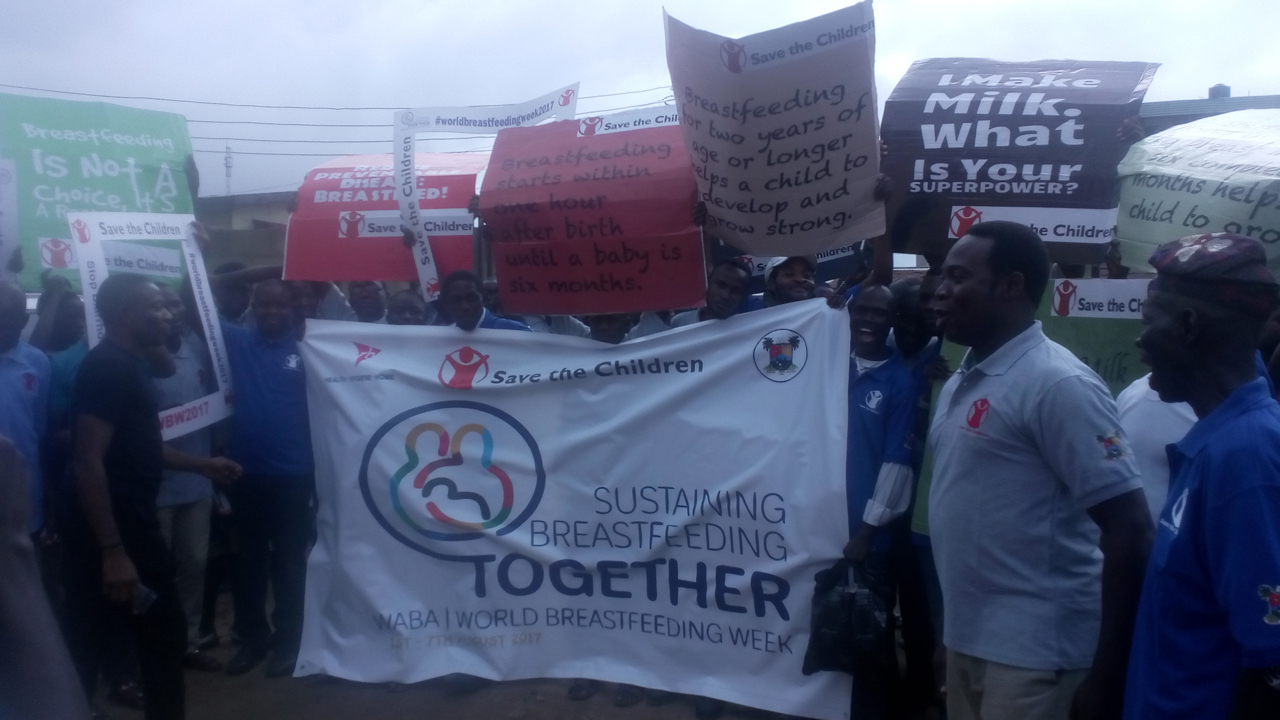
As part of its activities to commemorate the 2017 World breastfeeding week, members of Save the Children, a non-governmental organisation committed to the well-being of children, took to the streets to sensitize the general public especially the men on the need to support exclusive breastfeeding.
The walk which was held in partnership with Stop Diarrhoea Initiative (SDI) and Lagos State government with support from Reckitt Benckiser, took place at the streets of Somolu Local Government Area/Bariga Local Council Development Area, Lagos.
Men’s involvement according to the organisers will facilitate a high level of compliance with the practice.
Speaking at the event, David Atamewalen, Chief of Party, Stop Diarrhoea Initiative (SDI) noted that the level of compliance of exclusive breastfeeding is still a concern saying that as at 2014, the rate of compliance remains at 24 percent. According to him, that is more reason they are intensifying their effort by involving men in the activity.
“What we are doing today is to emphasize the involvement of men because we know that men play a long role in encouraging their wives to sustain exclusive breastfeeding. So our message today is that men should encourage their wives to sustain exclusive breastfeeding,” he said.
Explaining further, he said: “There are a lot of tasks that women are supposed to be doing when breastfeeding which the men can support them to do. Also, the male folk tend to believe that the breast belongs to them whereas it is actually for the children. Men should understand that the fact that the woman is going to be breastfeeding, there will be some physical changes in her body; they must be able to understand that. They must not emphasize that the breast must be firm, issues like this will discourage the women from adhering to exclusive breastfeeding.”
Speaking further, Mr Atamewalen said: “Basically what we are trying to do is that the seven point plan promulgated by UNICEF and World Health Organization (WHO) has the capacity to stop diarrhoea among under- five and this project is implemented in Somolu/Bariga. The plan is for us to demonstrate that when you adhere to the seventh point plan you will be able to stop diarrhoea in its tracks.
“We are here today because we are celebrating the global week of exclusive breastfeeding globally which is one of the seven-point plans.
“You know the understanding is that when you sustain a child on breast milk for the first six months of life, that child has a better opportunity to avoid all the killer diseases and when you have a stronger child improvement of development is ensured because the child will not be able to come down with any of the killer diseases that comes with diarrhea.
In collaboration with his submission, Folake Kuti, Advocacy Adviser, Save the Children said why they are involving men is that they need their support in the area of provision of good foods. Women need to eat a lot of nutritious foods while breastfeeding so that it can pass to the baby.
“When you are breast feeding, you eat a lot so you need a lot of nutritious food so that it can pass to the baby. So men should supply enough foodstuff and money for the woman to eat quality food and breastfeed very well. Even in the domestic work that women do, the men can assist them because those are some of the things that discourage women from completing exclusive breastfeeding for six months. But if the government, men, families are giving their support, I know that many women will want to do it,” she said.
On the economic benefit of breastfeeding, Mr Atamewalen said that the money one would have spent in taking a child to the hospital when they are down with diarrhoea will be saved. “You are not going to the hospital, the man hour wasted staying in the clinic is saved and it’s plunged back into the economy.
To further ensure a high level of compliance, Mr. Atamewalen however, appeal to the government to promulgation a policy which should include the private sector to ensure that the mothers once they deliver, should be given at least six months of break to ensure they breastfeed their babies. If it becomes a law, definitely the private sector will not have a choice than to comply.
In the same vein, Mrs. Kuti advocates: “If the government should make the private sectors put crèches in their offices so that the mother will be at peace at work knowing that her child is close by and can go there during break to breastfeed the baby that is also one of the ways that can help.



